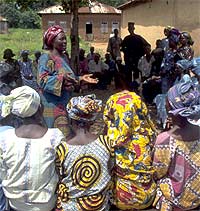Evaluation and lessons learned
Introduction
 |
| © UNICEF/HQ98-1089/Pirozzi |
| A community water committee discusses sanitation issues in the southern village of Sapele, Nigeria. |
Both evaluation and analysis of UNICEF programme cooperation are a core part of our work process.
Evaluation asks simple questions. What are the results of our work? Are we doing the right thing? Are we doing it well? We ask these questions about UNICEF-supported country programmes—UNICEF's specific contribution at country level—as well as how we work as an organization, regionally and globally. Asking these questions helps us learn and makes us more accountable to national partners, donors, sister organisations, ourselves and ultimately to children and women.
Identifying and analyzing programme cooperation is part of the search for excellence. This process results in the identification of innovations, lessons learned and good practices from UNICEF-supported programmes, advocacy or technical assistance. We distil from field experience, monitoring and evaluation as to what works in programming, advocacy and management, and why. These lessons learned and good practices feed into our country-level analysis and programming with partners and contribute to learning in the international community.
Evaluation and identifcation of innovations, lessons learned and good practices help UNICEF and partners achieve better results for children and women.
Evaluation Reports
Evaluation Office Publications
Also visit the Evaluation Database to access UNICEF’s other evaluations, studies and surveys.
United Nations Evaluation Group (UNEG)
The UN Evaluation Group (UNEG), established in January 1984, aims at providing a forum for the discussion of evaluation issues within the UN System organizations and at promote simplification and harmonization of evaluation. For more, visit the UNEG website.




















